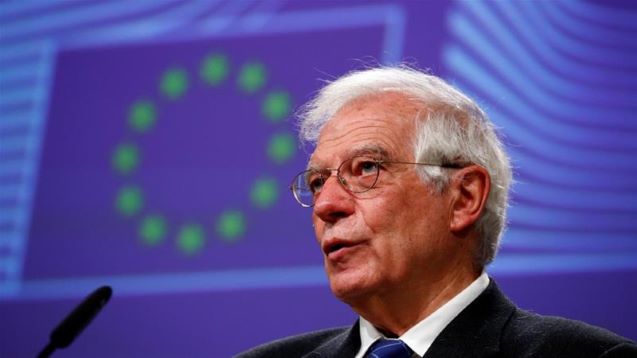A European Union naval mission to protect commercial shipping in the Red Sea from missile attacks by Houthi rebels in Yemen is expected to be launched on February 19, the bloc’s top diplomat announced on Wednesday.
“Maritime security in the Red Sea has significantly deteriorated over the last weeks and we are very much advancing the work of a new maritime operation in order to act in a purely defensive mode to protect merchant vessels,” Josep Borrell confirmed after an informal meeting of defence ministers in Brussels.
“Our goal is to establish and launch this mission, Aspides, at the latest on the 19 February, I hope, and I’m sure, we will,” he added. Foreign affairs ministers from across the bloc are scheduled to meet in the Belgian capital on that date and stamp the plan with their approval.
Iran-backed Houthis rebels in Yemen have launched missile and drone attacks on commercial ships in the Red Sea since the start of Israel’s offensive against the Gaza Strip following deadly attacks by the Hamas militant group against Israel on 7 October.
The Red Sea is a crucial trading route through which an estimated 12% of global trade including 30% of global container traffic passes.
The attacks have forced some major shipping companies to avoid the area in favour of longer, and therefore costlier, routes which have led to shipping delays and already forced some factories in Europe to temporarily halt production.
This, in turn, has raised fears that inflation, which in Western economies has been on a downward trend in recent months, could start climbing again and leave a more lasting impact on the economy.
So far only five member states have publicly indicated they will participate in the mission: Belgium, France, Germany, Greece, Italy.
Details that still need to be ironed out before 19 February include what military personnel and capabilities will be committed to the mission, which country will lead it and where the headquarters will be located.
Euronews understands France, Greece and Italy have pitched for the leadership role.
In the case of Belgium and Germany, the decision to join the mission will have to be ratified by lawmakers but officials from both countries appeared confident this could take place quickly.
“We are expecting the Council decision by February 19, which we can then follow up with the accelerated German referral to the Bundestag,” Siemtje Möller, Germany’s state secretary for defence, told reporters before Wednesday’s meeting.
“If the Bundestag agrees, the German navy will also participate. The navy is already in the process of preparing for this mandate or possible participation,” she added.
Belgian Defence Minister Ludivine Debonder meanwhile said that its Louise-Marie frigate, which is already in the region, would likely be part of the mission.
The EU mission will be strictly restricted to protecting ships and intercepting incoming missiles in contrast to the US and UK which have together bombed multiple Houthis targets on two separate occasions as part of Operation Prosperity Guardian.
Borrell stressed that the capabilities involved in Aspides will be “proportionate to the threat we are facing” and that “we will not conduct any operation on land, only on sea.”
“Of course, we will coordinate with other missions,” he added, referring to the US-led operation.__Courtesy EuroNews





